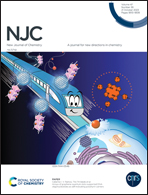A pH-responsive supramolecular antibacterial agent based on host–guest chemistry†
Abstract
Antibiotic resistance is a significant global health concern that requires novel approaches to tackle this serious crisis. In this study, we designed an intelligent supramolecular antibacterial agent using dequalinium chloride (DQ), cucurbit[7]urils (CB[7]), and maleic anhydride–cyclohexylamine hydrochloride (ADA–MA) based on supramolecular chemistry. The antibacterial activity of DQ was regulated by CB[7] and ADA–MA, based on the pH value of the infection microenvironment. The acidic infection microenvironment triggered the release of DQ from CB[7] and restored its antibacterial activity, while the neutral physiological environment maintained the stability of DQ@2CB[7] and turned off its antibacterial activity. This process provides a simple and effective strategy for regulating the biological activity of DQ on demand. It could “turn on” and “turn off” its antibacterial activity according to the needs of the infection microenvironment, thus delaying the generation of resistant bacteria and reducing the toxicity of the drug under physiological conditions.



 Please wait while we load your content...
Please wait while we load your content...